#The Ghost of Peter Sellers
Text
I Can't Go Back to that Market | Peter Quill x Male Reader
Fandom: Marvel
A/N: Sorry for any mistake. English is not my first language.

The ship landed on the target planet. We needed to find a seller for an item, although Peter wasn't planning on buying anything. We talked separately. Rocket and Groot went after more equipment and weapons for Rocket; Gamora and Drax were behind blades, swords, and things nearby while being followed by Mantis, while Peter and I were behind the store which was the goal of the Guardians on that planet.
I shoved my hands in the pockets of my aviator suit as we were getting a few stares for being two humans walking in space, but then being completely ignored.
One day on Earth, a group of alien criminals kidnapped me to sell me as an exotic human slave in space, but the Guardians kind of invaded the place and created a riot, amid the confusion I ran away and entered the Guardians' ship. It was at that moment that they saw the power that I had fought so hard to hide. Now they called me Ghost Pilot and I became Milano's official pilot.
We were hired to get an object from a store on this planet. I wanted to leave that planet full of criminals, space traffickers, and selling various other criminal products.
― Do you already know where we should go? ― I asked Peter as we walked through the streets of the foreign city.
― I think so. ― Peter spoke as they walked through the dangerous streets.
Since joining the Guardians of the Galaxy, he has discovered new planets and aliens that he had never imagined. I was sure the world was much bigger than a human could even imagine.
I approached a table of a man who was selling something that looked like it would be edible to other aliens, but to me, it was just some weird purple goo.
― Want to try one, Y/N? ― The foreigner behind the desk, who looked like a green insect, asked.
― How do you know my name? ― I ask scared.
― It's your name on the jacket, isn't it? ― the foreigner asked, pointing to the jacket I was wearing.
I had forgotten about it. I had on my leather aviator jacket that had my name on it. It reminded me that people on Earth probably thought I was dead.
― True, my bad. ― I said a little embarrassed.
― Want one? ― He asked, bringing a plate of purple goo closer to my face.
― I wouldn't eat it if I were you. ― Peter said looking with the same expression of disgust at the goo.
― I had lunch just now, I'm not hungry, thanks. ― I said, politely declining.
― You're the loser. ― He said as he handed it over to another customer.
Peter pulled me by my elbow to pull me away.
― Don't leave my side. ― Peter spoke as he walked past the criminals of the place.
― Sorry, I'm having fun getting to know other planets. ― I looked at the strange things they found in the scattered tents.
― Focus on our mission. ― Peter spoke while still holding my arm.
― I'm not a child, Peter. I can defend myself. ― I spoke, but there was no communication in my voice, yet I guided my arm from his hand.
― I know that, I just don't want you to get lost. ― Peter spoke worriedly.
Peter and I had been at it for a few days now. Show concern and sometimes even flirt with each other, but act like it's just a joke between friends.
― You're not going to abandon your pilot here. I said with a spontaneous smile.
― Rocket can fly.
I looked offended at Peter causing him to laugh.
― We're not going to abandon the best pilot we've ever had. Peter said putting his hand on my shoulder.
― Don't let Rocket hear you saying that. He will blow you up. ― I said laughing. ― Look how nice it is.
I said walking quickly to a tent with several different weapons. There were several types, including ones that were bigger than me. They were all obviously stolen, but it's not like anyone cared.
― Did any of them catch your eye? ― a blue-skinned foreigner who had a feature with tentacles-like hair, who I guessed was the owner of the shop, asked.
Peter approached, looking with interest at the grenades in the cases.
― Why don't you try this one? ― The foreigner asked to pick up a gun, next with a rifle and handed it to me.
I held tight and aimed for the wall, testing the weight. It was heavy and seemed to be those weapons with strong recoil.
― It's too heavy. ― I said returning the gun.
― And this one ?― He asked, handing over an oddly small pistol.
I held it and aimed, but the gun grip felt small and uncomfortable.
― I don't think so. ― I said returning the gun.
Then I saw two identical pistols in the display case. It was slightly larger than a regular pistol, especially the barrel which was longer than a human pistol. It was made of black metal with a purple light.
― Would you like to try? ― The foreigner asked, obviously wanting to get me to buy something.
I walked over and picked up the two pistols. I pointed to a wall to be able to test. It wasn't too heavy, but it wasn't too light either. The footprint was perfect. I turned to Peter displaying the weapons.
― What do you think? ― I asked Peter as he posed to show off the weapons.
― I think it suits you. ― Peter responded by raising an eyebrow. ― But do you know how to use a gun?
―Don't worry about it, Peter. ― I said carefree.
―Wait, there's more. ― The alien salesman said, taking the two pistols from my hand.
He moves his hand with one of the pistols making the fist lift and fit the other pistol, making it turn into a type of sniper rifle with a scope. The seller handed me the two guns that had now become just one. I aimed, looking through the scope on top of the gun.
― That's impressive. ― I said impressed with the gun. ― But I do not have money.
I said handing over the gun and the salesman seemed to make an expression of disgust with a mixture of anger that I had wasted his time.
― Let me pay. ― Peter said, handing over some crystal pieces to the seller who smiled again and handed me back the sniper rifle.
― Serious? You don't have to. ― I said, but I was already holding the gun tightly so I wouldn't let go.
― And I'll take it out of your pay later. ― Peter said, smiling at me.
― Very funny, Peter. ― I said rolling my eyes.
I let go of the two pistols making them go back to being two separate weapons. I handed the little money I had to the seller to buy the pistol holsters because obviously, he wasn't going to give anything away for free. And we left the ship. I was really happy with my new purchase.
― Thanks. ― I said to Peter as we walked back to the street.
― You pay me back later. ― Peter said laughing, but I knew he would charge me later.
After walking the streets for a while, we entered a shop with various artifacts and antiques. Peter's gaze wandered over the shelves until he finally found what we were looking for. Peter disguised his gaze so as not to show interest in the piece.
― I'm looking for a piece to give to my girlfriend. ― I approached the vendor so I could distract him.
― But of course, we have lots of jewelry that would make any woman's eyes sparkle. ― The alien with orange skin, four black eyes, and six thin arms spoke excitedly about having a new customer.
He took me to a showcase with several pieces of jewelry with different stones.
― Does your girlfriend have ears? These earrings could look beautiful. ― The alien asked, showing sparkling earrings.
― No, she doesn't have ears. ― I said, pretending to methodically analyze each piece there.
Meanwhile, Peter silently approached the golden egg he was going to steal.
― And a necklace? Every lady loves a necklace. ― He said, putting his hands together excitedly.
Peter reached for the golden egg and took it gently. He took it to his pocket, putting the object away.
― Do you wanna know? I don't think there's anything that would suit her. ― I said, pretending to be disappointed. ― Sorry to waste your time.
― You don't understand anything about beauty. ― The attendant said irritably.
Peter and I left the store. We try to walk calmly as if nothing is happening.
― It was easier than I thought. ― Peter spoke proudly.
― Get back here, thieves! ― The store attendant shouted from the store door.
― You had to talk. ― I complained as we started to run.
While running away from the store clerk, we ended up bumping into several people and knocking her into stalls, and breaking products. This drew a lot of attention and made more people chase us.
― Now you're feeling what it's like to be a Guardian of the Galaxy. ― Peter spoke as we ran.
Shots passed by us as they tried to hit us to stop or maybe even kill us. I saw a motorbike parked and I pulled Peter over to it.
― About there. ― I said and Peter went upstairs.
By touching the handlebars of the motorcycle, I let the spirit out of me. My jacket took on a charred appearance as my skin burned and I became a flaming skull.
I possessed the bike causing it to start and start roaring down the street. I heard the motorcycle owner complain but I was already gone. I revved the bike, leaving a trail of fire in my wake but going too fast to follow.
I dodged several people, not counting those who jumped out of the way. Some people were still shooting and others were trying to give chase. We were making a huge mess until we finally reached Milano.
I saw Rocket and Groot loading some weapons into the ship while the others helped them. When Gamora saw the mess that was following us, she drew the attention of the others, causing all but Drax to run into the ship. Drax drew his blades, excited for a fight, when Gamora returned and pulled him into the ship.
I stopped the bike haphazardly in front of the ship as we ran into the ship. Upon arriving in the control room, I sat in the pilot's chair and possessed Milano. The ship began to take off while I began to be possessed by my flaming spirit.
― Speeds up! Speeds up! Speeds up! ― Peter spoke desperately, slapping the bench that accompanied his voice.
― Let's kill them all! ― Drax yelled with his swords in hand, fully excited for a fight.
― What did you do? ― Gamora asked irritably.
― More importantly, did they manage to steal that golden egg? ― Rocket asked from above Gamora.
I accelerated the ship causing it to leave the planet. Everyone breathed a sigh of relief, except for Drax who looked disappointed that he couldn't fight.
But just when we thought everything would be calm, the ship's alerts warned that we were being pursued.
― Weapons in position. ― Peter spoke while Rocket and Gamora went to the ship's weapons.
I accelerated Milano while doing maneuvers to help Rocket and Gamora land the shots. Until finally I managed to lose them all.
― I think we made it. ― Gamora spoke, but still with her hand on the gun sights.
I engaged the ship's autopilot and rose from the pilot. Each one started to get distracted with what they liked to do on the ship and I went to Peter who was analyzing the Golden Egg he stole.
I approached looking at the Egg along with him.
― Why does he want this so badly? ― Peter asked, examining the piece carefully. ― Let's stall a little before we hand it over.
Peter spoke and was going to put his hand on my shoulder, but when he realized that I was still in Ghost Pilot form, he stopped for fear of getting burned. Realizing this, I suppressed the spirit within myself, causing me to revert to my human form.
― Sorry I forgot. ― I said when I got back to normal.
― Alright, do not worry. ― Peter smiling at me.
I looked at the egg more closely and noticed that it didn't appear to be massive, I picked it up from the table and it made me more sure of my theory.
― I think there's something inside. ― I said, turning the egg in my hand.
― Here. I think this is where it opens. ― Peter said, taking the egg from my hand.
He found a small knob of sorts on the side and as soon as he turned it, the egg opened like a sliced orange.
― What is that? ― I asked eyeing the glowing red crystal from within.
― I don't know. ― Peter said taking the crystal.
― You don't think he'll notice? ― I asked, smiling as I watched Peter put the crystal in his pocket.
― I'm sure he will. But let's get the money first. ― Peter said closing the Golden Egg again.
― It's just a little space thief. ― I said laughing.
― The way you like it. ― Peter said with a wink.
This time, I felt my face flush a little. He caught me off guard at that point and he knew it. Peter just smiled at me and put the egg back on the table.
— You can stop this nonsense, it's already tiring me. ― Rocket said as he walked by with some equipment he was setting up.
Peter and I looked away with a little embarrassment.
― I was just thinking…― Peter started a little nervously. ― If you don't want to go out some days?
―We're always through space. ― I said laughing.
― But this time it would be for a date. ― Peter said with a smile. ― What do you think?
― I think it sounds pretty good. ― I said with a smile.
#peter quill x male reader#star lord x male reader#starlord x male reader#peter quill x you#starlord x you#star lord x reader#x male reader#marvel#marvel x male reader#x reader#peter quill x reader
84 notes
·
View notes
Text
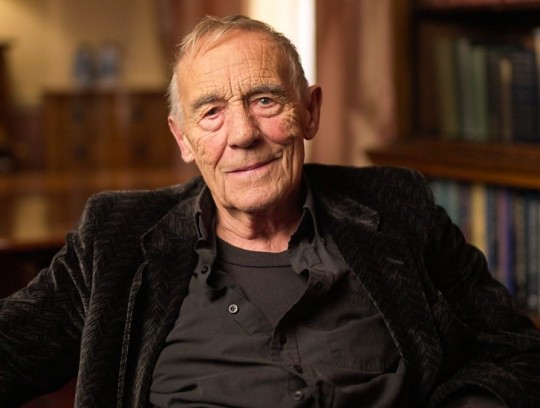
The actor Michael Jayston, who has died aged 88, was a distinguished performer on stage and screen. The roles that made his name were as the doomed Tsar Nicholas II of Russia in Franklin Schaffner’s sumptuous account of the last days of the Romanovs in Nicholas and Alexandra (1971), and as Alec Guinness’s intelligence minder in John Le Carré’s Tinker Tailor Soldier Spy on television in 1979. He never made a song and dance about himself and perhaps as a consequence was not launched in Hollywood, as were many of his contemporaries.
Before these two parts, he had already played a key role in The Power Game on television and Henry Ireton, Cromwell’s son-in-law, in Ken Hughes’s fine Cromwell (1969), with Richard Harris in the title role and Guinness as King Charles I. And this followed five years with the Royal Shakespeare Company including a trip to Broadway in Harold Pinter’s The Homecoming, in which he replaced Michael Bryant as Teddy, the brother who returns to the US and leaves his wife in London to “take care of” his father and siblings.
Jayston, who was not flamboyantly good-looking but clearly and solidly attractive, with a steely, no-nonsense, demeanour and a steady, piercing gaze, could “do” the Pinter menace as well as anyone, and that cast – who also made the 1973 movie directed by Peter Hall – included Pinter’s then wife, Vivien Merchant, as well as Paul Rogers and Ian Holm.
Jayston had found a replacement family in the theatre. Born Michael James in Nottingham, he was the only child of Myfanwy (nee Llewelyn) and Vincent; his father died of pneumonia, following a serious accident on the rugby field, when Michael was one, and his mother died when he was a barely a teenager. He was then brought up by his grandmother and an uncle, and found himself involved in amateur theatre while doing national service in the army; he directed a production of The Happiest Days of Your Life.
He continued in amateur theatre while working for two years as a trainee accountant for the National Coal Board and in Nottingham fish market, before winning a scholarship, aged 23, to the Guildhall School of Music and Drama in London, where he was five years older than everyone else on his course. He played in rep in Bangor, Northern Ireland, and at the Salisbury Playhouse before joining the Bristol Old Vic for two seasons in 1963.
At the RSC from 1965, he enjoyed good roles – Oswald in Ghosts, Bertram in All’s Well That Ends Well, Laertes to David Warner’s Hamlet – and was Demetrius in Hall’s film of A Midsummer Night’s Dream (1968), with Warner as Lysander in a romantic foursome with Diana Rigg and Helen Mirren.
But his RSC associate status did not translate itself into the stardom of, say, Alan Howard, Warner, Judi Dench, Ian Richardson and others at the time. He was never fazed or underrated in this company, but his career proceeded in a somewhat nebulous fashion, and Nicholas and Alexandra, for all its success and ballyhoo, did not bring him offers from the US.
Instead, he played Charles Lutwidge Dodgson (Lewis Carroll) in Alice’s Adventures in Wonderland (1972), a so-so British musical film version with music and lyrics by John Barry and Don Black, with Michael Crawford as the White Rabbit and Peter Sellers the March Hare. In 1979 he was a colonel in Zulu Dawn, a historically explanatory prequel to the earlier smash hit Zulu.
As an actor he seemed not to be a glory-hunter. Instead, in the 1980s, he turned in stylish and well-received leading performances in Noël Coward’s Private Lives, at the Duchess, opposite Maria Aitken (1980); as Captain von Trapp in the first major London revival of The Sound of Music at the Apollo Victoria in 1981, opposite Petula Clark; and, best of all, as Mirabell, often a thankless role, in William Gaskill’s superb 1984 revival, at Chichester and the Haymarket, of The Way of the World, by William Congreve, opposite Maggie Smith as Millamant.
Nor was he averse to taking over the leading roles in plays such as Peter Shaffer’s Equus (1973) or Brian Friel’s Dancing at Lughnasa (1992), roles first occupied in London by Alec McCowen. He rejoined the National Theatre – he had been Gratiano with Laurence Olivier and Joan Plowright in The Merchant of Venice directed by Jonathan Miller in 1974 – to play a delightful Home Counties Ratty in the return of Alan Bennett’s blissful, Edwardian The Wind in the Willows in 1994.
On television, he was a favourite side-kick of David Jason in 13 episodes of David Nobbs’s A Bit of a Do (1989) – as the solicitor Neville Badger in a series of social functions and parties across West Yorkshire – and in four episodes of The Darling Buds of May (1992) as Ernest Bristow, the brewery owner. He appeared again with Jason in a 1996 episode of Only Fools and Horses.
He figured for the first time on fan sites when he appeared in the 1986 Doctor Who season The Trial of a Time Lord as Valeyard, the prosecuting counsel. In the new millennium he passed through both EastEnders and Coronation Street before bolstering the most lurid storyline of all in Emmerdale (2007-08): he was Donald de Souza, an unpleasant old cove who fell out with his family and invited his disaffected wife to push him off a cliff on the moors in his wheelchair, but died later of a heart attack.
By now living on the south coast, Jayston gravitated easily towards Chichester as a crusty old colonel – married to Wendy Craig – in Coward’s engaging early play Easy Virtue, in 1999, and, three years later, in 2002, as a hectored husband, called Hector, to Patricia Routledge’s dotty duchess in Timberlake Wertenbaker’s translation of Jean Anouilh’s Léocadia under the title Wild Orchids.
And then, in 2007, he exuded a tough spirituality as a confessor to David Suchet’s pragmatic pope-maker in The Last Confession, an old-fashioned but gripping Vatican thriller of financial and political finagling told in flashback. Roger Crane’s play transferred from Chichester to the Haymarket and toured abroad with a fine panoply of senior British actors, Jayston included.
After another collaboration with Jason, and Warner, in the television movie Albert’s Memorial (2009), a touching tale of old war-time buddies making sure one of them is buried on the German soil where first they met, and a theatre tour in Ronald Harwood’s musicians-in-retirement Quartet in 2010 with Susannah York, Gwen Taylor and Timothy West, he made occasional television appearances in Midsomer Murders, Doctors and Casualty. Last year he provided an introduction to a re-run of Tinker Tailor on BBC Four. He seemed always to be busy, available for all seasons.
As a keen cricketer (he also played darts and chess), Jayston was a member of the MCC and the Lord’s Taverners. After moving to Brighton, he became a member of Sussex county cricket club and played for Rottingdean, where he was also president.
His first two marriages – to the actor Lynn Farleigh in 1965 and the glass engraver Heather Sneddon in 1970 – ended in divorce. From his second marriage he had two sons, Tom and Ben, and a daughter, Li-an. In 1979 he married Ann Smithson, a nurse, and they had a son, Richard, and daughter, Katie.
🔔 Michael Jayston (Michael James), actor, born 29 October 1935; died 5 February 2024
Daily inspiration. Discover more photos at Just for Books…?
12 notes
·
View notes
Text
the fact that peter sellers and peter boyle (celebrity favs) interacted on screen in ghost in the noonday sun (1973) for 2.5 seconds really means that nothing is impossible . if you care
5 notes
·
View notes
Text

JERZY KOSINSKI, Toronto 1988
I was vaguely aware that Jerzy Kosinski was under a cloud of scandal when I photographed him at the 1988 authors festival, but I didn't know the details and in any case he was the most distinguished writer I photographed in that little alcove off the main lobby of the festival hotel on the lakeshore. The hit Hal Ashby movie version of his third book, Being There, starring Peter Sellers, had made him famous as a celebrity and not just a writer. I'd read his acclaimed first novel The Painted Bird as a student, then subsequent books like Steps, The Devil Tree, Cockpit and Passion Play. He'd been the president of PEN twice and starred in Warren Beaty's film Reds; he was a frequent guest on talk shows, played polo and moved in high society as well as literary circles. It was an incredible success story for a man who had emigrated to the US from communist Poland in 1957, sponsored by a fake foundation he had created, and forging letters from communist officials guaranteeing that he'd return. In retrospect this deception would end up setting the tone for his life decades later.

The rumours about Jerzy Kosinski's work had as much to do with his working methods as allegations of plagiarism or his inspiration. It began with charges that the CIA had sponsored his first two nonfiction, anti-communist books, written under the pseudonym Joseph Novak. It was widely assumed that the nightmarish story of the Jewish boy hiding from Nazis in the Polish countryside told in The Painted Bird was based on Kosinski's own wartime experience, and later attempts to correct this did nothing to dispel suspicion that grew as he became more successful and high profile. Critics in Poland had attacked him when Being There was published, claiming that it was based on a Polish novel famous when Kosinski was a boy. Kosinski was known to have an active and kinky sex life, which no doubt fueled resentment that ended up focusing on his creative methods, which employed multiple editorial assistants - translators and editors and proofreaders. By the time I photographed Kosinski this had turned into a campaign to discredit him, started in earnest by a 1982 Village Voice article, and the book Kosinski was promoting at the authors festival in 1988 was The Hermit of 69th Street, his attempt to address the allegations in a kind of literary fantasy.


The Hermit of 69th Street, the book Jerzy Kosinski was promoting when I photographed him, was a curious attempt to answer his accusers and rebut the allegations made about his creative methods and inspiration. Presented as a collection of papers left to Kosinski by another writer, Norbert Kosky, who had left them behind on a leased fishing boat after his disappearance, Kosky was clearly Kosinski's alter ego, but the book's 529 pages do little to frame a clear self-defense of the writer. It's a maddening book - far less satisfying than anything else he'd written before - and seems like it was meant to taunt both his enemies and supporters. It's full of puerile sexual wordplay and imagery (the frequent use of the number 69, for instance) Kosky/Kosinski writes about the "privately hired, part-time professional literary vulvar cleft, be it a typist, a proofreader, a line editor or even a licensed full-time galley printer - an indispensable tax deductible literary ghost every writer must employ at one time or another." Then goes on to admit that "the very thought of a woman typist excites him. Whether she is black, yellow or white; whether she is nice or nasty, petty or pretty, stubbornly fat or weakened by anorexia nervosa or by typing novels written in Esperanto, he cares not."


Kosinski could not, of course, directly address the creative process by which writers produce their work, fiction or nonfiction - that would have been pulling back the curtain on a profession that was still admired, even revered, back in an age when a man who looked like him could be both regularly on the bestseller lists and infamous as a bit of a sexual satyr. It's a world that seems like a long time ago now, and subsequent scandals in journalism and the publishing world over plagiarism and authenticity (Stephen Glass, James Frey, Jonah Lehrer, Herman Rosenblat, "JT LeRoy", Jayson Blair) have dulled us to just how damaging the charges against Kosinski were to his reputation, despite his high profile defenders at places like the New York Times. I can't claim that I tried to suggest any of this in my brief shoot with Jerzy Kosinski in that little space off that hotel lobby, but the man had a defiance about him that I think I captured in these frames. I put one of these shots in my portfolio where it stayed for many years, until Kosinski's infamy had subsided into the first stages of obscurity, and I got tired of having to explain who he was when showing my book. Jerzy Kosinski committed suicide in his New York apartment three years after I took these photos.

#portrait#portrait photography#photography#black and white#film photography#writer#jerzy kosinski#pentax spotmatic#early work#some old pictures i took
2 notes
·
View notes
Text
Masterlist
Who I write for is listed below:
Individual masterlists will be linked as they are created. Don't see a character you like? Send me an ask! I may be willing to add them.
American Horror Story
The Countess
Dandy Mott
Misty Day
Bates Motel/Psycho
Norma Bates
Norman Bates
Blade
Deacon Frost
Eric Brooks/Blade
Mercury
Bleach
Byakuya Kuchiki
Findorr Calius
Gin Ichimaru
Jin Kariya
Kenpachi Zaraki
Kensei Muguruma
Mayuri Kurotsuchi
Retsu Unohana
Ryo Utagawa
Sosuke Aizen
Szayelaporro Granz
Yoshi
Cabinet of Curiosities
Jenkins Brown (possessing Walter)
Richard Pickman
Walter Gilman
Cobra Kai/The Karate Kid
Da-Eun Kim
Daniel LaRusso
John Kreese
Terry Silver
Courage the Cowardly Dog
Black Puddle Queen
Freaky Fred
The Crow
Eric Draven
Myca
Top Dollar
DC
Bruce Wayne/Batman (Bale)
Edward Nashton/The Riddler (Dano)
Edward Nygma/The Riddler (Carrey + Smith)
Fish Mooney
Harley Quinn (Robbie)
Jervis Tetch/ Hatter
Jonathan Crane/Scarecrow (Murphy)
Joker (Ledger + Phoenix)
Orm Marius
Oswald Cobblepot (Taylor)
Victor Zsasz (Carrigan)
Dead to Me
Jen Harding
Judy Hale
Disney (* denotes live action only)
Claude Frollo
Cruella DeVil* (2021)
Diaval*
Maleficent*
King Stefan*
Evil Dead Rise
Ellie
The Faculty
Edward Furlong
Elizabeth Burke
Joe Willis
Firefly Trilogy
Baby Firefly
Otis B Driftwood
Foxy Coltraine
Final Fantasy
Cid Bunansa/Dr. Cid
Kadaj
Loz
Lulu
Rufus Shinra
Sephiroth
Seymour Guado
Vayne Solidor
Vincent Valentine
Yazoo
Funny Games
Paul
Peter
Game of Thrones
Brienne of Tarth
Cersei Lannister
Jaqen H'Ghar
Margaery Tyrell
Melisandre
Petyr Baelish
Ramsay Bolton
House of the Dragon
Aemond Targaryen
Daemon Targaryen
Larys Strong
Hunter x Hunter
Chrollo Lucifer
Hisoka Morou
Illumi Zoldyck
Uvogin
Insidious
Josh Lambert + Parker Crane possessing Josh
Steven "Specs" Fisher
Jujutsu Kaisen
Choso Kamo
Geto Suguru (+ Kenjaku)
Mahito
Mei Mei
Nanami Kento
Ryomen Sukuna
Toji Fushiguro
The Legend of Zelda
Ganondorf (Twilight Princess)
Ghirahim
Midna
Sidon
Zant
The Letter for the King
Jaro
Viridian
Lord of the Rings/The Hobbit
Beorn
Grima Wormtongue
Thranduil
MCU
Agatha Harkness
Heimdall
Hela
M'Baku
Melina Vostokoff
Namor/K’uk’ulkan
Natasha Romanoff
Norman Osborn/Green Goblin
Okoye
Olivia Octavius/Doc Ock
Otto Octavius/Doc Ock
Peter Parker (Maguire)
Ultron
Wanda Maximoff
My Hero Academa
Enji Todoroki/Endeavor
Shota Aizawa/Eraserhead
Naruto
Deidara
Hidan
Kakazu
Kisame
Orochimaru
One Piece (Live Action ONLY)
Buggy
Garp
Kuro
Sanji
Repo! The Genetic Opera
Amber Sweet
Luigi Largo
Nathan Wallace
Pavi Largo
Saw
Adam Faulkner-Stanheight
Amanda Young
John Kramer
Silent Hill
Pyramid Head
Vincent Smith
Stranger Things
001/Henry Creel
Dmitri "Enzo" Antonov
Joyce Byers
Thirteen Ghosts:
Dana Newman/The Angry Princess
Dennis Rafkin
Horace Mahoney/The Juggernaut
Royce Clayton/The Torn Prince
Ryan Kuhn/The Jackal
Us:
Abraham
Tex
Wednesday
Larissa Weems
Marilyn Thornhill
Would You Rather
Julian Lambrick
Shepard Lambrick
X-Files
Cecil L'ively
Dana Scully
Fox Mulder
Luther Lee Boggs
Misc. Characters
Adrian Tepes/Alucard (Castlevania)
Albert Shaw/The Grabber (The Black Phone)
Bill Cipher (Gravity Falls)
Bo Sinclair (House of Wax)
Cesaire (Red Riding Hood)
Commodus (Gladiator)
Creepy Thin Man (Charlie's Angels)
Daniel Robitaille/Candyman (1992)
Doug Davis (Cooties)
Dracula (Lugosi + Bang)
Ellie (Evil Dead Rise)
Habit (EverymanHYBRID)
John Ryder (The Hitcher)
John Wick
Kruger (Elysium)
Kusuriuri/Medicine Seller (Mononoke)
L Lawliet (Death Note)
The Man (Hush)
Moira (The Princess)
Quentin Shermer/The Blissfield Butcher (Freaky)
Rachel Summers (The Uninvited)
Ransom Drysdale (Knives Out)
Ross Humboldt (In the Tall Grass)
Celebrities* (see request rules)
Angela Bassett
Idris Elba
Jeffrey Dean Morgan
Kathryn Hahn
Patrick Wilson
Sigourney Weaver
Vera Farmiga
24 notes
·
View notes
Text
Lights, Camera, Bones by Carolyn Haines
Lights, Camera, Bones
Sarah Booth Delaney Mystery Book 27
Carolyn Haines
Minotaur Pub
May 21st, 2024
Lights, Camera, Bones by Carolyn Haines is another installment in the Sarah Booth Delaney Mysteries. Murder, kidnappings, a shark named Betty, and downright rotten people keep this book moving along at a good clip.
“I have always been fascinated by the story of the 1927 Greenville Mississippi flood. My grandmother was the County Historian and she had talked about and painted visit pictures of the flood, about people stuck and having to be rescued. This captured my imagination. I have been going to the Delta area for a long time, doing book signings. The history of Greenville has been interesting, a real boom town for a long time. People might think that having a shark in the story is unrealistic, but I read a true story about this bull shark that swam up the Mississippi River. This was the inspiration for the book. I set my books in the South because that is the area I know and love.”
The main character is Sarah Booth who owns the Delaney Detective Agency. She is ably assisted in her investigations by her partner Tinkie, Coleman Peters who is her love interest and the sheriff of Sunflower County, a ghost named Jitty, and her animal companions. Sarah is very nonsense, and she was very adept at solving mysteries. Her partner, Tinkie, was a Southern Belle who is a bit sassy. There are two protagonists who become people of interest.
“Mary Doyle is sharp, funny, high-handed, and sarcastic with a sense of humor. She feels guilty over once losing her assistant to a shark when she was a former marine biologist but has redeeming qualities because she is now a book seller. The other person, Bilbo is manipulative, arrogant, a political animal, and a narcissist.”
Delaney Detective Agency gets a taste of the spotlight when they are called to a case on a movie set in Greenville, MS, right on the Mississippi River. Marlon Brandon, heir to a wealthy and influential political family, has brought a film crew to town to film a drama about the 1927 flood that submerged a great deal of Greenville. He is a local man that is starring in the movie and has written the screenplay. Marlon wants the world to know the story of the flood―and the heroic role the Brandon ancestors played in rescuing dozens of residents from drowning.
But from the start there are a lot of people who don’t want this story told. And his own grandfather seems to be on the fence about it. Their protest was allegedly tied to people be stranded intentionally to keep workers from leaving during the flood.
“I based Marlon Brandon on Marlon Brando, the actor. I am always interested in movies and stories that entertain and educate. Because Greenville has been in such an economic slump, I thought how a movie would bring income to town. I wish someone would film a movie there.”
When one of the casts ends up dead in the river, they also find a shark swimming around in there. And when Marlon goes missing as well, Sarah and Tinkie are going to go all in to find him and remove the shark to another location. Unfortunately, this could get them in a lot of trouble and possibly could get them dead!
“I called sharks killing machines. They always must swim forward. Bull sharks are an aggressive species. They eat what they can bite.”
The plot is very interesting. It delves into old money and the power that goes with it, murky family histories, and issues of racism as the plot progresses, readers learn bits of history, as well as how someone’s relationship with their family impacts current life. There are also bits of information regarding sharks.
0 notes
Text
XOXO Repackage aka one of the greatest albums of all kpop history,who gave us the nation's anthem,a ghost in Growl MV,1 million seller(thing that didn't happened since 1st gen),cultural reset who changed the K-pop industry forever and with iconic bangers like Don't Go,Peter Pan,Lucky,Baby Don't Cry,Black Pear,etcl;is 10 years old now. Damn,that is nostalgic af!
1 note
·
View note
Photo
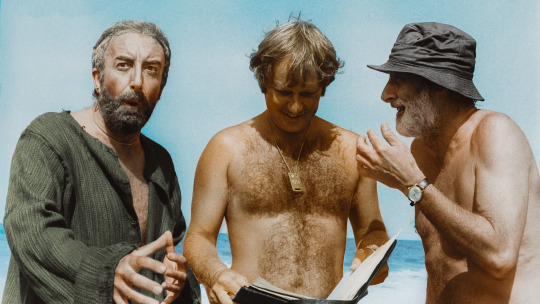
Peter Sellers, Director Peter Medak and Spike Milligan on location during the making of Ghost in the Noonday Sun.
#Peter Medak#Director#Peter Sellers#Spike Milligan#Ghost in the Noonday Sun#1974#The Ghost of Peter Sellers
7 notes
·
View notes
Photo

The first trailer for The Ghost of Peter Sellers explores a disastrous movie production.
28 notes
·
View notes
Text

Chris: somewhat repetitive and it would have been useful if the surviving scenes were shown in order along with the plot being described to recreate the lost film; it’s still neat seeing scenes of Peter Sellers that were lost, Watch: When Free.
Richie: it was very repetitive, Watch: When Free only if you have a specific interest in Peter Sellers.
1 note
·
View note
Photo
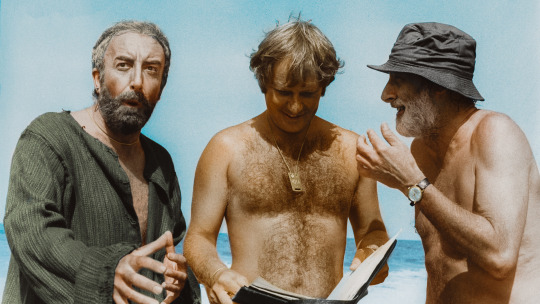
Ghosted Films: A Director’s Nightmare.
To mark a conversation with Peter Medak about his new documentary The Ghost of Peter Sellers, which details a particularly tumultuous early 1970s film shoot, Dominic Corry looks at how the inherently nightmarish pursuit that is filmmaking has informed other movies.
“Every frame you set up references yourself and your entire life, so bits and pieces indirectly of your life go into every movie.” —Peter Medak
On a certain level, filmmaking is an essentially traumatic experience. The extreme number of moving parts, umpteen tiers of variables—both creative and practical—and the cacophony of egos involved all amount to what in the best-case scenario could generously be considered organized chaos.
And for the most part, it all falls on the director’s shoulders. Although the long-prevailing auteur theory is regularly and healthily challenged these days, our default perception tends to be that whatever happens, good or bad, it’s the director’s fault. Some directors process their filmmaking nightmares by writing a review of the film on Letterboxd. But in the case of journeyman filmmaker Peter Medak (The Changeling, The Krays, Romeo Is Bleeding), he chose to process his filmmaking trauma by… making a film about it.
The Ghost of Peter Sellers revisits the making of the 1974 Peter Sellers-starring pirate comedy Ghost in the Noonday Sun, an infamous folly of a film that has long haunted Medak. It’s also one of those rare films on Letterboxd: at the time of writing it has just two reviews, and only 26 members in a community of two million have noted seeing it. Giving it one and a half stars, EWMasters writes: “Pretty awful. I mean talk about throwing it on the stoop and seeing if the cat’ll lick it up. There is one very good sequence where the crew goes to town on this big plate of fish and vegetables that’s really well done—but otherwise, this is really only worth the time of a Sellers completist”. (Perhaps the main character’s name—Dick Scratcher—should have sounded alarm bells.)
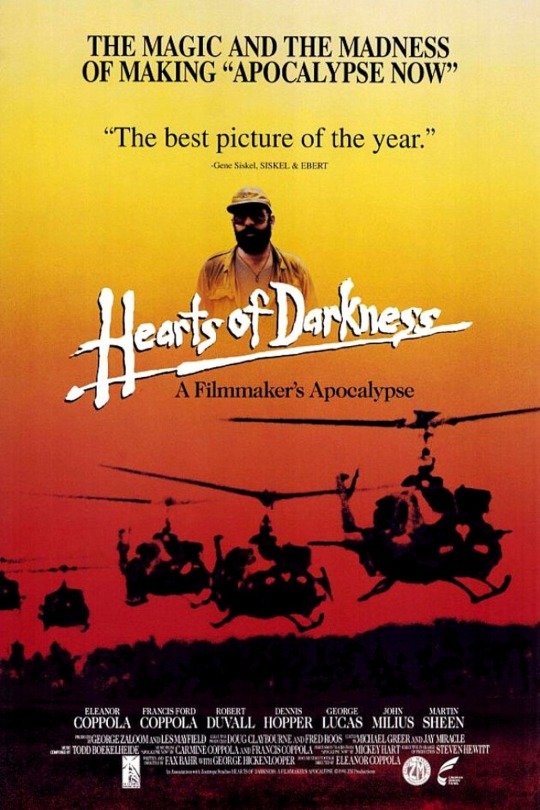
Medak is not the first filmmaker to spin non-fictional gold out of a director’s nightmare (in this case, his own). His movie follows in the footsteps of legendary documentaries such as Fax Bahr and George Hickenlooper’s 1991 film Hearts of Darkness: A Filmmaker’s Apocalypse, which revealed the full extent of the already infamous insanity that comprised the making of Francis Ford Coppola’s 1979 classic Apocalypse Now, and used extensive footage shot at the time by Coppola’s filmmaker wife Eleanor (filmmaker spouses are handy to have along for the ride, as Nicolas Winding Refn also knows). And there’s Keith Fulton and Louis Pepe’s 2002 work Lost in La Mancha, which detailed Terry Gilliam’s (ironically?) Sisyphean efforts to film an adaptation of The Man Who Killed Don Quixote.
In both instances, the films in question were (eventually) made—and released to some acclaim (one considerably more than the other)—but as The Ghost of Peter Sellers shows, the shooting of Ghost in the Noonday Sun was such an epic boondoggle that the unfinished film sat unreleased for years and was much later released to no acclaim whatsoever.
The uphill battle to make his never-released horror movie Northwestern made indie filmmaker Mark Borshadt an unlikely filmmaking hero thanks to the breakout success of Chris Smith’s 1999 documentary American Movie. Like with Ghost in the Noonday Sun, the efforts to make a film proved more interesting than the film being made.
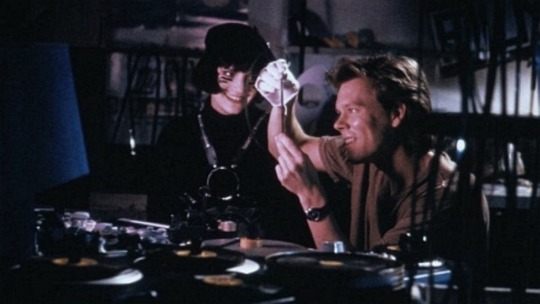
Jennifer Jason Leigh and Kevin Bacon in ‘The Big Picture’ (1989).
There are several narrative films of note that have successfully captured the specific pandemonium of filmmaking. Richard Rush’s 1980 cult classic The Stunt Man follows a fugitive who stumbles his way into the titular job on a big chaotic Hollywood production (Peter O’Toole plays the Machiavellian director), while Christopher Guest’s under-appreciated 1989 comedy The Big Picture stars Kevin Bacon as a hot young director who is roughed up by the Hollywood machine. It’s a notable and often overlooked antecedent to The Player, and like the Robert Altman classic, is more about ‘the business’ overall than the specifics of filmmaking, although in both cases Hollywood proves itself analogically appropriate.
Playwright, writer and director David Mamet’s own filmmaking experiences obviously inform his 2000 comedy State and Main, in which a Hollywood production takes over and smothers a small town with its singular thinking. It’s not hard to imagine Mamet processing his own filmmaking trauma in State and Main, just as the Coen brothers famously did in Barton Fink, their ode to writer’s block supposedly inspired by the difficulty they had penning the screenplay for Miller’s Crossing.
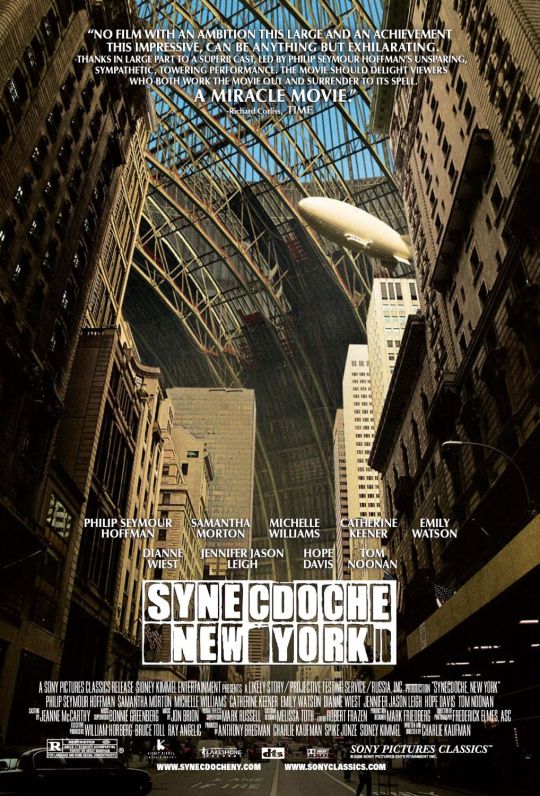
Charlie Kaufman channeled his own creative struggles into the screenplay for the 2002 masterpiece Adaptation, then built on those themes with his wildly ambitious 2008 directorial debut Synecdoche, New York, whose more maddening aspects arguably capture the irrational nightmare that is filmmaking better than any film directly ‘about’ filmmaking.
With her 2018 documentary Shirkers, writer Sandi Tan gained some measure of closure regarding an indie film she had starred in and written in her home country of Singapore, in 1992. The documentary (which shares its name with the original movie) has her revisiting the footage from the never-released film, which was stolen (!) 25 years previously by its director—and Tan’s filmmaking mentor—George Cardona.
Back to Peter Medak. In The Ghost of Peter Sellers, which premiered at Telluride Film Festival in 2018 and has just had its virtual screening release, we learn that Hungarian-born Medak was a rising directing star in the early 1970s in London, hot off the Oscar-nominated Peter O’Toole film The Ruling Class. Unable to resist an offer to work with Peter Sellers, then comedy’s reigning superstar—mostly thanks to Blake Edwards’ Pink Panther films—Medak set about shooting a treasure-hunting pirate film on the island nation of Cyprus in the Mediterranean.
In addition to the usual production problems associated with shooting on boats, Medak had to contend with the titanically and infamously fickle Sellers, who quickly turned on him and attempted to get him fired. Sellers also antagonized the other actors, then, after failing to get the production shut down, brought in his friend and longtime creative collaborator Spike Milligan to try and salvage the film, but things kept going wrong, leaving Ghost in the Noonday Sun unfinished and Medak with the blame for the production’s troubles.
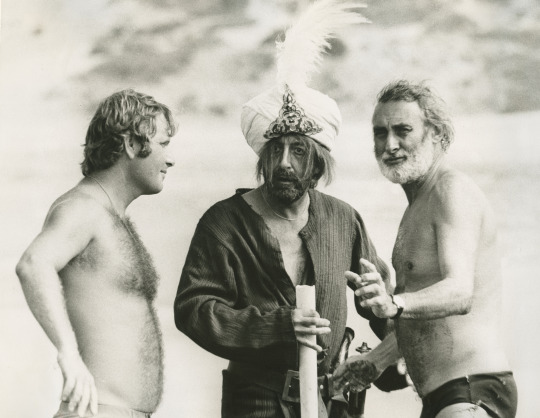
Director Peter Medak with Peter Sellers (as Dick Scratcher) and Spike Milligan (as Bill Bombay) on the set of ‘Ghost in the Noonday Sun’, finally released in 1984.
Although Medak’s career recovered, he has clearly been carrying around a lot of hurt associated with the experience, and it’s remarkable watching him work through that on screen by revisiting Cyprus, telling the story of the shoot, and talking to some of the people involved. Sellers (who died in 1980) looms large over the film, but it also has interesting content surrounding the great Spike Milligan, who died in 2002.
Why did you decide to revisit this experience with a documentary?
Peter Medak: Because it’s been haunting me for all these years. Because it should’ve been a really very successful film and I was blamed for everything going wrong, when in fact it had nothing to do with me. It was due to Peter’s changing mind and state of mind, and all kinds of things had physically gone wrong on the film. It was always easiest to blame the director for everything and my career at the time was very high up after [The] Ruling Class and this should’ve been the icing on the cake and it wasn’t.
It really bothered me for many years afterwards, even though I went on working. I was asked to do it by the producer of the documentary and I originally said “It’s the last thing I want to do”, because it would mean I would have to go back to Cyprus where I shot the original movie and go on the water, and I never want anything to do with water anymore because a lot of the disasters on the film, production-wise, were all connected with shooting at sea, which is totally impossible to do. Then I thought: well, you know, I should just do it and try to explain what happened on the film. And because some of the explanations were funnier scenes than the original film. So that’s why I did it.
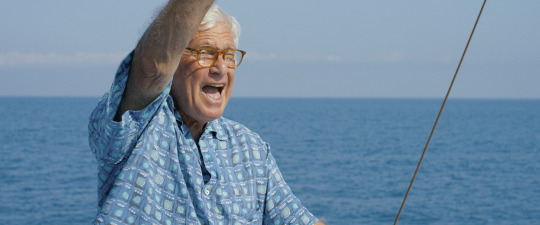
Peter Medak fishing for answers in ‘The Ghost of Peter Sellers’.
In the documentary, you talk about needing to free yourself from the experience by making this film. Do you feel like you achieved that?
Well, I think I did because I had a wonderful time doing it. A very sad time at the same time because when you go back to places where you shot 45 years before, it creates a very strange kind of illusion inside your mind, your heart and everything of the time. And having been there then and then being there again, it’s a very strange kind of a supernatural feeling in a way. It felt like you have died and your ghost is actually revisiting all these things you know. I called it The Ghost of Peter Sellers because it sounds good and also because the original film was called Ghost in the Noonday Sun, and this ghostly feeling of mine of revisiting that island after all these years, it’s a very, very strange feeling and somehow the film captures that emotionally.
Do you feel like the large distance from the shoot was necessary to be able to revisit it?
It’s not that I thought about it every day of my life, but I talked about it to all the people who I worked with in my following career. When I was doing Romeo Is Bleeding with Gary Oldman, my darling Gary said to me one day, “You know, we are crazy, what we should do is make a movie about your movie, but I don’t want to play Peter Sellers, I want to play you, with your Hungarian, broken-English accent.” We had a script written but we never did it. That was a good 25 years ago.
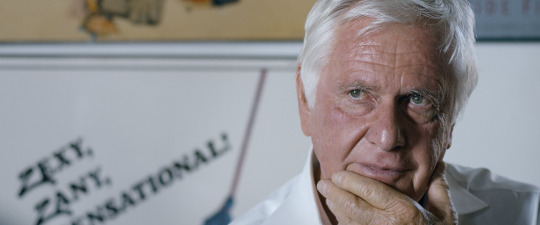
Peter Medak in front of a promotional poster for ‘Zorro, The Gay Blade’, his 1981 film starring George Hamilton and Lauren Hutton.
So you had considered doing a scripted version of it?
Yeah, but I don’t know quite what we would’ve done. I said to Gary at the time: “I never want to go on a boat again”, and so I thought in my mind that the scenes would start each day [with] the characters getting off the pirate ship and they come ashore—that’s where the scenes would begin. I’m sure we would’ve done something quite wonderful, and it would’ve maybe explained the things the [documentary is] trying to explain because I guess that’s what has unconsciously driven me. Because [for the documentary], we didn’t write one word of it, I just completely did it out of instinct. Where I want to shoot, what I want to shoot, and how we should go from here to there. I loved it, so going back on to it was quite easy. It did show me actually what a wonderful medium it is, documentary, because you can do anything with it. It’s a much freer form than scripted movies. Which is rigid. And this is liquid.
Did you have any other documentaries about filmmaking in mind when you went into this?
Not really. I knew Terry Gilliam’s Lost in La Mancha, because I love Terry and I love his films and we know each other and knew each other. Terry was very fortunate, because he had so much trouble before on Baron Munchausen, that he decided to have a documentary film crew filming the whole process, so he had the material available, which allowed him to make his film. I said to him after [a screening], “You were lucky because you didn’t make the movie. I had to suffer through 90-something days of shooting with Peter [Sellers].” But of course since then, Terry made the film, and he made something slightly different than what he was originally gonna do.
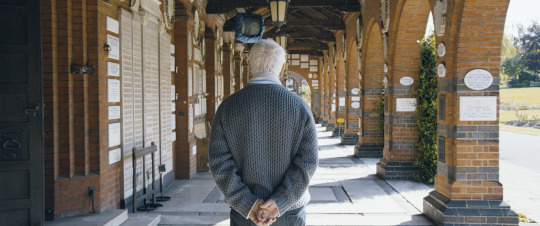
Peter Medak retraces his steps in ‘The Ghost of Peter Sellers’.
Did any of your subsequent films feel nearly as difficult?
Most movies are very difficult to make, and always when you anticipate problems, they never seem to happen. When I did The Changeling, everybody said “George C. Scott is very, very difficult to work with” and he was an absolute angel with me and [it was] the easiest thing to do. It was a wonderful ghost story. I’m very proud of that film. It will live forever. All movies are like your kids, your own children, because you put so much emotion, so much of your soul. That’s what I’m saying to [Ghost in the Noonday Sun executive producer] John Heyman [in The Ghost of Peter Sellers]: the director’s viewpoint is completely different from the producer’s because every frame you set up references yourself and your entire life, so bits and pieces indirectly of your life go into every movie. Because of that it becomes an incredibly personal journey when you put your absolute soul on the line. When it gets criticized or not accepted or whatever, one takes it very personally because the whole thing came from a very personal experience, even though the subject may be nothing to do with you.
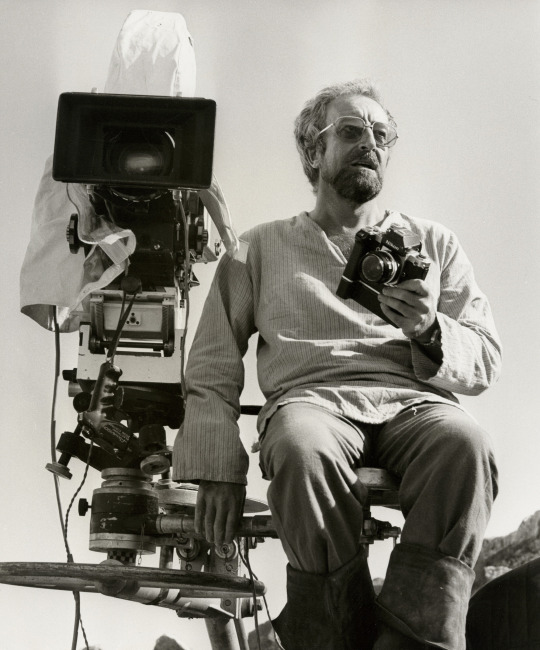
Peter Sellers on the set of ‘Ghost in the Noonday Sun’.
Even within the canon of famously difficult performers, Peter Sellers is notorious. How would you describe him to a modern audience?
Well he was a genius, there’s no question about it. But he was a manic-depressive person. And it’s a generalization, but most of the great comics are manic-depressive. And he changes his mind all the time. One minute, he loves you, next minute, he hates you. One minute he loves the subject, next minute he doesn’t wanna do it, he wants to get out and all that. So it is very up and down. When you’re running film with a crew of 150 people, and boats on the sea, and weather’s changing and everything, you can’t have that, because you fall behind the schedule and things go wrong.
At one point very early on, all he wanted to do was get off the movie. And then he did everything he [could] to sabotage the film so the film would close down and he wouldn’t have to finish it. But it didn’t just happen on my film, it happened with all his biggest successes, including the Pink Panther movies. Because if you look into Blake Edwards, each one was an absolute nightmare for the director and for the film company, United Artists. And I was gonna include that in the documentary but it had nothing to do with the Ghost in the Noonday Sun so I didn’t. I actually shot some scenes with one of the executives from United Artists at that time who had to deal with the insanity of Peter and also Blake Edwards. I say ‘insanity’; I didn’t want to say it too much in the documentary because I love Peter, even today. And it’s wrong for me to accuse him of those things because it sounds like I’m excusing myself. Peter was crazy. There’s no other way one can describe it. Touched by God. And so was Spike Milligan. But Spike had the love of goodness. Peter had kind of a nasty streak on him when he turned on people.
There’s a moment in the documentary where you suggest that Spike Milligan is more influential than he gets credit for. Do you think he’s under-appreciated?
Totally. Totally. Totally. Because his talent was absolutely, monumentally genius. I always say this, but Spike basically created Peter Sellers through [legendary BBC radio programme] The Goon Show. And he also gave him all those various characters and developed those voices for him. It’s all in The Goon Show. The Monty Pythons, they were inspired by The Goon Show and they made it into television. Not story wise, but style wise. That kind of zany, insane humor. Spike was a total genius. Not that Peter wasn’t, but they stood together, completely overwhelmingly wonderfully insane. But Spike was quite something. He was incredibly human, he was incredibly gentle. And incredibly kind. Peter was incredibly combative. And he had that most incredible ego.
But all our lives come from our backgrounds and what our past was and where we come from, and Peter had a very sad upbringing and a very sad life and he was tremendously influenced by his mother. When his mother passed away, he kept on talking to her for ten years. When he came to Cyprus to make the movie, he arrived with big blow-up [photos] of Liza Minnelli—who he’d just broken up with a week before—and his mum. And it sounds terrible when one says it, but psychologically, some of the answers are there. But at the same time, both Peter and Spike, I can’t tell you what a gift it was… I mean the reason I did the film is: who could give up the chance of actually working with Peter Sellers and Spike Milligan? It doesn’t matter what the fucking script is, you know? It was a wonderful thing and I would do it all over again tomorrow.
Related content
Our Showdown on films within films
‘The Ghost of Peter Sellers’ is screening in virtual theaters now. It will be available via video on demand services from June 23. A list of all the films mentioned in this article can be found here. Comments have been edited for clarity and length.
#peter medak#peter sellers#ghost in the noonday sun#the ghost of peter sellers#filmmaking fails#directing#documentary#filmmaking process#filmmaking#spike milligan#the goon show#monty python#the specific pandemonium of filmmaking#epic boondoggle#letterboxd
7 notes
·
View notes
Photo

Screener Squad: The Ghost of Peter Sellers THE GHOST OF PETER SELLERS MOVIE REVIEW No, this movie is not about the ghost of Peter Sellers haunting a film studio by reenacting his famous characters. As fun as that would have been, this is actually a very personal documentary about the catastrophic production of the 1973 movie, “The Ghost in the Noonday Sun”.… Read More »Screener Squad: The Ghost of Peter Sellers read more on One of Us
#documentary#movie review#podcast#Screener Squad#The Ghost of Peter Sellers#Documentary#film#Movie Review
0 notes
Text
peter sellers in his ghost in the noonday sun post-liza minnelli era is really something like he looks like he’s about to yell at any random person in public just a stray hair away from auctioning off his vintage car collection and strangling peter medak

the face of a man who just starred in some really awful slop and will not hesitate to do it again
4 notes
·
View notes
Text
The Ghost of Peter Sellers

Peter Sellers has always been a curious figure.
Imitated, parodied, celebrated, overrated… there’s a lot of views on the man immortalised as Inspector Clouseau. Seen by many as one of the very great talents, comic and otherwise, his off as well as on screen shenanigans is too the stuff of Hollywood legend.
Not always acquiring the greatest reputation, one flick that hasn’t significantly contributed to Sellers’ oeuvre was the 17th century pirate film he made, or didn’t quite; the very subject of this new documentary centred on a relatively obscure corner of cinema.
A production as outlined plagued by mishap and misfortune from start to finish, here the filmmakers reunite after decades to debrief and unpack just what and how much went wrong. The Ghost of Peter Sellers’ creators doubling as interview subjects throughout, their and very largely their account(s) form the basis of this retelling.
Much of the archival footage first and foremost is a joy to behold. There is something supremely, intrinsically amusing, and intendedly so, about watching the cast, in the throes of any which crisis, wandering about the sets in none too common garb. Recounting the events surrounding the tempestuous production, The Ghost of Peter Sellers is as much as anything else a cautionary tale for filmmakers who have winced at like affairs that have long survived in infamy.
Most interesting when covering the man himself, the documentary diverges in lengths from chronicling the filmic fallout to examine the much debated and apparently detested comedian. A combination of classic footage and interviews alongside accounts of Sellers’ own films and chosen roles proffering ideas of just who he was and what contributed to this contentious if inarguably distinctive comic talent, these tranches are the most endearing for their uncommon and in respects hitherto unsung insight into the still beloved performer.
The Ghost of Peter Sellers screens as part of the Melbourne Documentary Film Festival on July 19 at 8:45PM at Cinema Nova
on Festevez
#xl#reviews#festivals#the ghost of peter sellers#peter sellers#mdff#mdff 2019#melbourne documentary film festival#melbourne documentary film festival 2019
0 notes
Photo

6 notes
·
View notes
Photo

Peter Medak, centre, directs Peter Sellers, left, and Spike Milligan in the unreleased Ghost in the Noonday Sun in 1973 on location in Cyprus.
Photograph: World Film Services.
7 notes
·
View notes